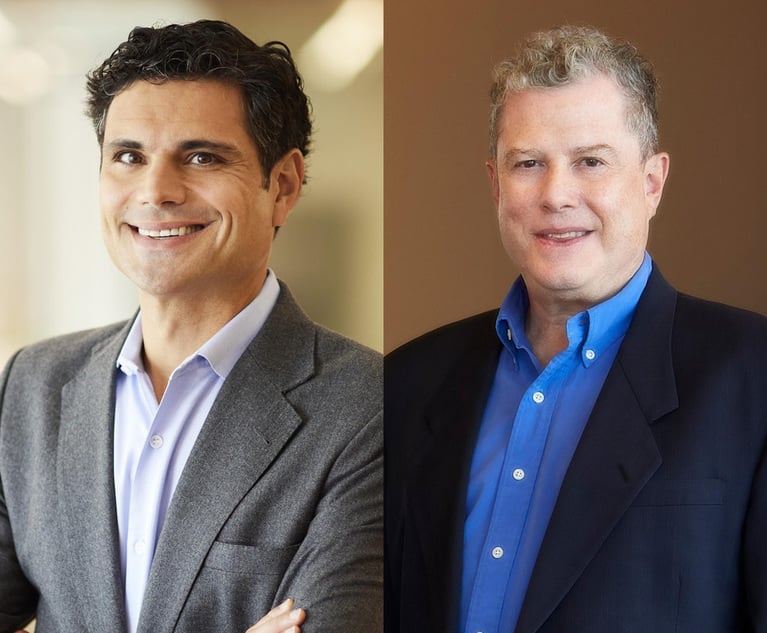First Circuit Narrowly Preserves Workers' Compensation Suit Against Canada
The decision establishes an incentive for sovereign states to enroll in workers' compensation programs to cover United States citizens whom they employ for non-diplomatic roles.
December 04, 2019 at 11:00 AM
8 minute read
 L-R Erika Todd, Nicholas O'Donnell and Anna Lea Setz, Sullivan & Worcester in Boston.
L-R Erika Todd, Nicholas O'Donnell and Anna Lea Setz, Sullivan & Worcester in Boston.
 In a cautious decision, the United States Court of Appeals for the First Circuit held that sovereign immunity does not protect Canada against a claim brought by a clerical worker who sustained injuries while working at its Boston consulate. The First Circuit held that the case was properly brought under the commercial activity exception of the Foreign Sovereign Immunities Act (FSIA). Merlini v. Canada, 926 F.3d 21 (1st Cir. 2019) ("Merlini I"). Four months later, the First Circuit narrowly denied rehearing en banc, and two dissenting judges urged the Supreme Court to grant certiorari. Merlini v. Canada, 2019 U.S. App. LEXIS 31679 (1st Cir. Oct. 23, 2019) ("Merlini II"). The decision establishes an incentive for sovereign states to enroll in workers' compensation programs to cover United States citizens whom they employ for non-diplomatic roles.
In a cautious decision, the United States Court of Appeals for the First Circuit held that sovereign immunity does not protect Canada against a claim brought by a clerical worker who sustained injuries while working at its Boston consulate. The First Circuit held that the case was properly brought under the commercial activity exception of the Foreign Sovereign Immunities Act (FSIA). Merlini v. Canada, 926 F.3d 21 (1st Cir. 2019) ("Merlini I"). Four months later, the First Circuit narrowly denied rehearing en banc, and two dissenting judges urged the Supreme Court to grant certiorari. Merlini v. Canada, 2019 U.S. App. LEXIS 31679 (1st Cir. Oct. 23, 2019) ("Merlini II"). The decision establishes an incentive for sovereign states to enroll in workers' compensation programs to cover United States citizens whom they employ for non-diplomatic roles.
The First Circuit's Holding
Plaintiff Cynthia Merlini, a United States citizen, was injured on the job while doing clerical work at the Canadian consulate in Boston. Canada, which does not participate in the Massachusetts workers' compensation system, paid Merlini under its own national workers' compensation system. When Canada stopped paying benefits, Merlini sought relief under the Massachusetts Workers' Compensation Act (MWCA).
The First Circuit held that Canada was subject to jurisdiction pursuant to the commercial activity exception to the FSIA. 28 U.S.C. §1605(a)(2). The First Circuit explained that whether conduct constitutes a "commercial activity" under the FSIA depends upon the "nature" of the activity, not its "purpose." Merlini I, 926 F.3d at 28. The court held that Canada's employment of a clerical worker was, by its nature, commercial.
The court next held that Merlini's suit was "based on" Canada's employment of her. Id. at 29–31. The court grounded its holding on the precise nature of the MWCA. Under the MWCA, an uninsured employer (like Canada) faces strict liability for workplace injury claims. The court held that Merlini's complaint was therefore based on the fact of her employment, and not based on any particular negligence that may have caused her injury. The First Circuit explained that Merlini's claim "requires no proof that any fellow employee engaged in any particular conduct." Id. at 30. Instead, her employment itself was the cornerstone of her claim. Her "employment did not simply 'le[ad] to' the injury that she received; it provides the legal basis for the only cause of action that she has against her employer for the injury for which she seeks to recover." Id.
The court was careful to emphasize that its ruling reached only the specific facts before it. It repeatedly mentioned that Merlini was a United States citizen, did not hold Canadian citizenship, and performed clerical work. The court wrote: "We … do not mean to suggest that the outcome would be the same if Merlini's position were not purely clerical." Id. at 31. The court supported this narrow holding by referencing the legislative record of the FSIA, which states: "Activities such as a foreign government's … employment or engagement of laborers, clerical staff or public relations or marketing agents … would be among those included within the definition of a commercial activity." H.R. Rep. 94-1487 (1976). Whether non-clerical workers can seek redress from sovereign employers, and at what point a job becomes non-clerical, are questions beyond the scope of this decision.
The First Circuit's decision primarily focused on the texts of the FSIA, the MWCA, and the legislative record. It also considered—and rejected—Canada's policy-oriented argument based on international comity. The court acknowledged that the FSIA provides sovereign immunity "'as a gesture of comity,'" but it held: "by including the 'commercial activity' exception in the FSIA, Congress made clear that those concerns do not provide a reason to extend the protection to foreign states with respect to a suit that the 'commercial activity' exception encompasses." Merlini I, 926 F.3d at 38-39 (quoting Bolivarian Republic of Venez. v. Helmerich & Payne Int'l Drilling Co., 137 S.Ct. 1312, 1322 (2017)). This holding aligned the First Circuit with the D.C. Circuit, which has held that comity-based common law defenses cannot be raised when a suit is properly brought under the FSIA. See de Csepel v. Republic of Hungary, 859 F.3d 1094 (D.C. Cir. 2017). (The D.C. Circuit rule is currently the subject of two petitions for certiorari. Sullivan & Worcester represents the plaintiffs in opposing one of those petitions: Petition for Writ of Certiorari, Federal Republic of Germany v. Philipp, No. 19-351 (Supreme Court Sep. 18, 2019)).
The Dissenting View
Three of the six First Circuit judges dissented from the denial of en banc review. Judge Torruella opined in favor of granting en banc review because Canada's appeal raises "a question of exceptional importance" pursuant to Fed. R. App. P. 35(a)(2). Merlini II, 2019 U.S. App. LEXIS 31679, at *1-2.
Judge Lynch, with whom Chief Judge Howard joined, dissented more sharply and urged the Supreme Court to review the case. Judge Lynch first attacked the foundation of the majority opinion: the premise that Merlini's suit was "based on" Canada's employment of her. Instead, he argued, the core legal issue and basis of Merlini's claim is "Canada's sovereign choice, by legislation, to have its own workers' compensation scheme for all of its government employees." Id. at *4. He asserted that the majority's opinion misconstrued Saudi Arabia v. Nelson, 507 U.S. 349, 356 (1993), and OBB Personenverkehr AG v. Sachs, 136 S.Ct. 390, 396 (2015), where the Supreme Court rejected attempts to apply the FSIA's commercial activity exception where a claim only had "a mere connection with, or relation to, commercial activity." Nelson, 507 U.S. at 358. This argument adopted Canada's position, in its petition for rehearing, that the actual "gravamen" of Merlini's complaint is not the commercial relationship between the parties but "Canada's setting and administering its exclusive rules governing workers compensation for consular employees." Appellee's Petition for Panel Rehearing and Rehearing En Banc, filed July 24, 2019, at 9.
The dissent asserted that the majority's opinion creates a circuit split because it conflicts with cases from the D.C., Second and Ninth Circuits. Merlini II, 2019 U.S. App. LEXIS 31679, at *4 (citing Anglo-Iberia Underwriting Mgmt. v. P.T. Jamsostek, 600 F.3d 171 (2d Cir. 2010); Jungquist v. Sheikh Sultan Bin Khalifa Al Nahyan, 115 F.3d 1020, 325 U.S. App. D.C. 117 (D.C. Cir. 1997); Gregorian v. Izvestia, 871 F.2d 1515 (9th Cir. 1989), and MacArthur Area Citizens Ass'n v. Republic of Peru, 809 F.2d 918, 258 U.S. App. D.C. 77 (D.C. Cir. 1987)). (These cases involve other types of claims outside the workers' compensation context.)
Further, the dissent criticized the majority's reliance on the legislative history of the FSIA and its rationale that Canada would only lose sovereign immunity as to low-level, clerical employees. Judge Lynch wrote that the text of the FSIA does not provide for a different treatment of lower and higher-level employees. Id. (citing FSIA §1605). Therefore, the reliance on the legislative history of the FSIA violates the tenet that legislative history may not be used to alter text. Id. at *4-5 (citing Food Mktg. Inst. v. Argus Leader Media, 139 S.Ct. 2356, 2364 (2019) ("Even those of us who sometimes consult legislative history will never allow it to be used to 'muddy' the meaning of 'clear statutory language.'") (quoting Milner v. Dep't of Navy, 562 U.S. 562, 572 (1999))). Even if the use of legislative history were appropriate, so the dissent argued, the majority's reliance on the House Committee Report was inappropriate because "isolated snippets of legislative history" should not be used "as authoritative evidence of congressional intent …." Id. at fn. 1 (quoting Am. Broad. Cos. v. Aereo, 573 U.S. 431, 457-58 (2014) (Scalia J., dissenting)).
Finally, the dissent expressed concern that the majority opinion will have a negative reciprocal effect on U.S. foreign affairs, which would be adverse to national interest. He referred to Boos v. Barry, 485 U.S. 312, 323–24 (1988), in which the Supreme Court explained that the purpose of protecting other countries' sovereign immunity is so that the U.S. would receive similar protections abroad. Merlini II, 2019 U.S. App. LEXIS 31679, at *5. The United States—like Canada—relies on its sovereign immunity and applies U.S. workers' compensation law to foreign nationals employed by U.S. embassies and consulates around the world. By denying Canada's choice to implement its own federal workers' compensation scheme, the U.S. risks losing deference to its Federal Employees' Compensation Act for foreign embassy and consulate employees.
If Canada follows the dissent's prompting and petitions for certiorari, the Supreme Court may resolve these questions regarding the scope of the commercial activity exception and the use of legislative history to interpret the FSIA. Until then, foreign sovereigns who do not participate in state workers' compensations programs face the possibility of lawsuits by their U.S.-based employees.
Nicholas O'Donnell is a partner with Sullivan & Worcester in Boston. His practice focuses primarily on complex civil litigation. Anna Lea Setz is an associate in the Litigation Department of the firm's New York office. Erika Todd is an associate in the Boston office, whose practice includes complex commercial and employment matters.
This content has been archived. It is available through our partners, LexisNexis® and Bloomberg Law.
To view this content, please continue to their sites.
Not a Lexis Subscriber?
Subscribe Now
Not a Bloomberg Law Subscriber?
Subscribe Now
NOT FOR REPRINT
© 2025 ALM Global, LLC, All Rights Reserved. Request academic re-use from www.copyright.com. All other uses, submit a request to [email protected]. For more information visit Asset & Logo Licensing.
You Might Like
View All
GOP Now Holds FTC Gavel, but Dems Signal They'll Be a Rowdy Minority
6 minute read
‘Diminishing Returns’: Is the Superstar Supreme Court Lawyer Overvalued?

Eighth Circuit Determines No Standing for Website User Concerned With Privacy Who Challenged Session-Replay Technology
7 minute read
Leaning Into ‘Core’ Strengths, Jenner’s Revenue Climbs 17%, Profits Soar 23%
4 minute readTrending Stories
Who Got The Work
J. Brugh Lower of Gibbons has entered an appearance for industrial equipment supplier Devco Corporation in a pending trademark infringement lawsuit. The suit, accusing the defendant of selling knock-off Graco products, was filed Dec. 18 in New Jersey District Court by Rivkin Radler on behalf of Graco Inc. and Graco Minnesota. The case, assigned to U.S. District Judge Zahid N. Quraishi, is 3:24-cv-11294, Graco Inc. et al v. Devco Corporation.
Who Got The Work
Rebecca Maller-Stein and Kent A. Yalowitz of Arnold & Porter Kaye Scholer have entered their appearances for Hanaco Venture Capital and its executives, Lior Prosor and David Frankel, in a pending securities lawsuit. The action, filed on Dec. 24 in New York Southern District Court by Zell, Aron & Co. on behalf of Goldeneye Advisors, accuses the defendants of negligently and fraudulently managing the plaintiff's $1 million investment. The case, assigned to U.S. District Judge Vernon S. Broderick, is 1:24-cv-09918, Goldeneye Advisors, LLC v. Hanaco Venture Capital, Ltd. et al.
Who Got The Work
Attorneys from A&O Shearman has stepped in as defense counsel for Toronto-Dominion Bank and other defendants in a pending securities class action. The suit, filed Dec. 11 in New York Southern District Court by Bleichmar Fonti & Auld, accuses the defendants of concealing the bank's 'pervasive' deficiencies in regards to its compliance with the Bank Secrecy Act and the quality of its anti-money laundering controls. The case, assigned to U.S. District Judge Arun Subramanian, is 1:24-cv-09445, Gonzalez v. The Toronto-Dominion Bank et al.
Who Got The Work
Crown Castle International, a Pennsylvania company providing shared communications infrastructure, has turned to Luke D. Wolf of Gordon Rees Scully Mansukhani to fend off a pending breach-of-contract lawsuit. The court action, filed Nov. 25 in Michigan Eastern District Court by Hooper Hathaway PC on behalf of The Town Residences LLC, accuses Crown Castle of failing to transfer approximately $30,000 in utility payments from T-Mobile in breach of a roof-top lease and assignment agreement. The case, assigned to U.S. District Judge Susan K. Declercq, is 2:24-cv-13131, The Town Residences LLC v. T-Mobile US, Inc. et al.
Who Got The Work
Wilfred P. Coronato and Daniel M. Schwartz of McCarter & English have stepped in as defense counsel to Electrolux Home Products Inc. in a pending product liability lawsuit. The court action, filed Nov. 26 in New York Eastern District Court by Poulos Lopiccolo PC and Nagel Rice LLP on behalf of David Stern, alleges that the defendant's refrigerators’ drawers and shelving repeatedly break and fall apart within months after purchase. The case, assigned to U.S. District Judge Joan M. Azrack, is 2:24-cv-08204, Stern v. Electrolux Home Products, Inc.
Featured Firms
Law Offices of Gary Martin Hays & Associates, P.C.
(470) 294-1674
Law Offices of Mark E. Salomone
(857) 444-6468
Smith & Hassler
(713) 739-1250








